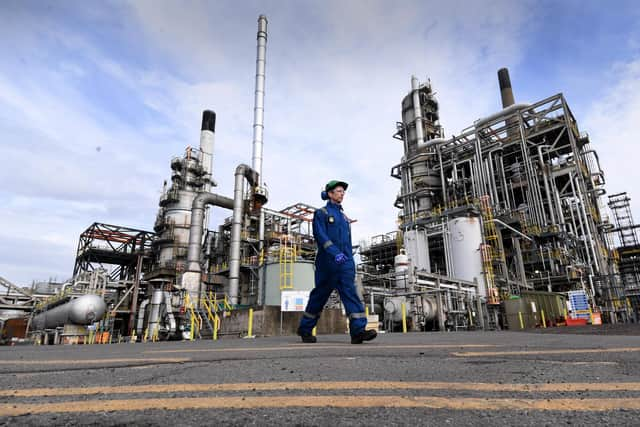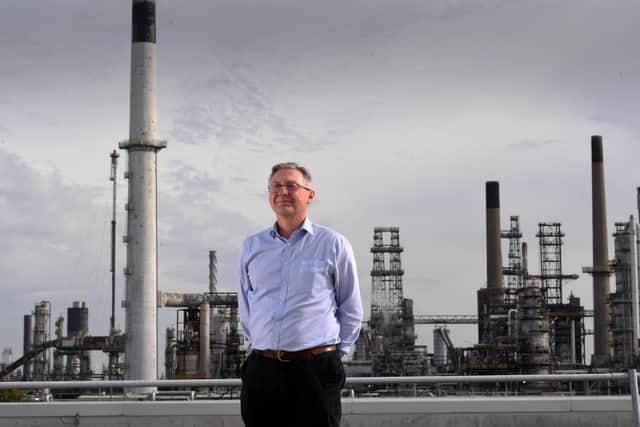Phillips 66: How huge Humberside oil refinery is powering mass production of electric car batteries
While Rishi Sunak may have recently delayed a ban on new petrol and diesel cars for five years, there is one unexpected place where the accelerator is still very much being pressed on facilitating the electric vehicle revolution.
The Humber Refinery in South Killingholme, North Lincolnshire, is run by US giant Phillips 66 and currently produces around 15 per cent of the UK’s road fuels with a processing capacity of more than 200,000 barrels per day.
Advertisement
Hide AdAdvertisement
Hide AdHowever, the company is attempting to position itself as a “refinery of the future” and has plans to spend hundreds of millions on reducing its carbon emissions by 90 per cent over the next decade.


But one fast-growing area of work already well under way is its production of a key component in the manufacture of electric cars.
It now makes enough battery anode coke to put around 1.3 million new electric vehicles on the road every year - and has ambitions to go further.
The Yorkshire Post paid a visit to the site to learn more about the process from the experts behind it, an undertaking which raises some challenging broader questions about exactly how eco-friendly electric car production currently is.
Advertisement
Hide AdAdvertisement
Hide AdChris Gilbert, decarbonisation lead for the refinery, explains that the battery anode coke comes from refining crude oil.


“You take a barrel of crude and make road fuel, you make jet fuel and then as part of the process at the bottom of the barrel you are left with a process called delayed coking,” he says.
“Some refineries do it and they make different grades of coke that effectively goes into coal and into power stations. We have learned over the years with particular feedstocks that we run to make certain grades of coke that have certain uses. We are the only one in Europe so it puts us in a unique place.”
The speciality graphite coke has been produced on site for 40 years and put to a variety of uses but it is only since 2016 that it has gone towards the EV battery market.
Advertisement
Hide AdAdvertisement
Hide AdRefinery manager Paul Fursey says: “We have gone from nothing to enough production for 1.3 million vehicles in seven years. There’s nobody else in Europe anywhere close.”
After being produced at the refinery, the coke is then sent to specialist sites in China to turn it into the anodes that go into the electric car batteries.
Fursey says the company would prefer to use domestic production but it is not currently possible.
“The coke we make today goes all the way to China, gets processed, gets turned into batteries and put into vehicles that end up in the car park back here. Having a domestic or European supply chain is a far better environmental solution for the planet without having to go all the way to China.
Advertisement
Hide AdAdvertisement
Hide Ad“All the technical know-how is in China. We’ve heard stories about companies like Britishvolt that tried to get off the ground and failed with ambition probably greater than their capability. But there are plenty of other companies out there that want to be part of the supply chain. But they’ve got to grow that technological capability.”
Gilbert adds it is hoped such work will form part of the broader strategy to decarbonise the industry-heavy Humber, which currently has the country’s highest level of carbon emissions.
He says: “The vision for the area is we will produce the coke and then together with carbon capture that will attract companies in the manufacturing sector. That is the vision.
“The Government has support and we are also talking to some companies who also do most of their operations in China at the moment.”
Advertisement
Hide AdAdvertisement
Hide AdFursey admits there is something of a global “arms race” for the production of electric vehicle components such as anodes.
The processes and techniques used to create the Phillips 66 product are a closely guarded secret but their battery coke is aimed at the premium end of the market as car manufacturers and their customers demand high-performing batteries.
Shaun Mullins, Principal Coke Technology Consultant, explains: “We have some unique processes and we have been through the learning curve. A lot of research goes on and there is a lot of customer feedback and trying lots of things. There’s a lot of to and fro with clients to get it right.
“The result is our coke is high quality and consistent.”
In line with their understandable approach to commercial confidentiality, Fursey says the company does intend to grow its battery coke production but won’t give numbers.
Advertisement
Hide AdAdvertisement
Hide AdHe adds: “Ultimately for electric vehicles there are other challenges around availability of cobalt, access to charging locations, electricity distribution, all those challenges that are out there that will ultimately restrict growth in this area to some degree.”
He says the five-year UK delay announced by Sunak has limited impact on the company’s plans given its global aspirations.
“When you think about the amount of vehicles on the planet and in the UK, that is a small impact. The scale of growth is huge. 2022 was the first year in the UK where electric vehicle sales outpaced diesel vehicle sales. But it takes 15 to 20 years to turn over the car park through natural ageing of vehicles.
“Car manufacturers have grown their brands on how cars look, how they perform and the consumer experience. Move into batteries and there is a different challenge there for them now.
“If we all buy the same car, brand and model, we want the battery to perform the same way. Having that consistency of supply and quality is key.”